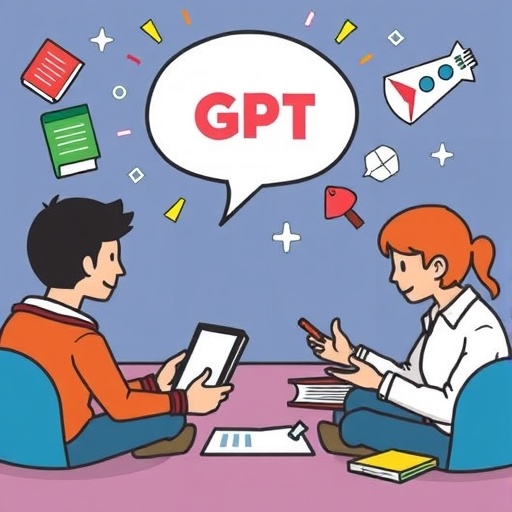In an era where artificial intelligence continues to make waves across various sectors, the role of innovative tools like ChatGPT in education is garnering increasing attention. A recent study conducted by S.K. Karri, B.S. Sai, and P.K. Singh sheds light on this phenomenon, particularly in the context of vocabulary acquisition and autonomous learning among competitive exam aspirants in Visakhapatnam. With educational landscapes shifting toward digital solutions, the research explores perceptions surrounding the utility of AI-assisted language models in enhancing learning experiences.
The findings indicate a significant intrigue among students concerning the capabilities of ChatGPT to aid vocabulary acquisition. In an ever-competitive environment where examinations dictate academic trajectories, students are exploring resources that can give them a linguistic edge. The allure of technology such as ChatGPT lies not just in its prowess in generating human-like text, but also in its potential to facilitate deeper engagement with language through interactive dialogues and instant feedback. This shift toward interactive learning models is poised to redefine traditional pedagogies and confront challenges that have long existed in language acquisition.
Teachers have long advocated the importance of vocabulary in language mastery. Having a robust lexicon opens doors to better comprehension and more articulated expression. By leveraging AI tools, such as ChatGPT, students claim to experience a more varied and contextual learning process. The AI’s ability to present vocabulary in scenarios, and various contexts enhances retention and application of language in real-world situations. The immediacy of feedback from AI models serves as an encouraging platform for learners, who may feel hesitant in traditional learning settings due to critique or judgment.
However, the extent of ChatGPT’s effectiveness is not merely rooted in its capabilities but also in how learners perceive its role in their educational journeys. The study notes a dichotomy in responses; while many students view ChatGPT as a revolutionary ally in their quest for language mastery, others express skepticism about the limitations of AI. Concerns surface about the accuracy of information provided and the potential for an over-reliance on technology, which may dilute essential language skills such as critical thinking and creativity.
Furthermore, the research highlights the concept of autonomous learning, where students become self-directed in their educational pursuits. The digital age has provided learners with tools that empower them to take charge of their educational paths. By utilizing ChatGPT, students have the opportunity to explore vocabulary outside classroom constraints, experiment with language freely, and engage in learning at their own pace. This newfound independence is reshaping the student-teacher dynamic, wherein educators act more as facilitators than traditional knowledge dispensers.
Additionally, the study delves into the implications of AI-driven tools on diverse learning needs. ChatGPT provides personalized experiences, accommodating different learning styles and paces. For students who may struggle in conventional settings, ChatGPT offers an alternative, non-threatening interface where they can continuously assess and expand their vocabulary without fear of failure or embarrassment. This novel approach serves a crucial function for learners at varying levels of proficiency as they prepare for competitive examinations.
However, the integration of AI in education is not without its challenges. The research draws attention to the digital divide that still exists, whereby not all students have equal access to AI technologies. This tech gap could inadvertently perpetuate educational inequalities, rendering some students at a disadvantage compared to their peers. As educational institutions contemplate integrating AI into their curriculums, ensuring equitable access to these tools becomes imperative.
Moreover, it is essential to understand that while ChatGPT may assist in vocabulary building, it cannot replace the nuanced understanding of language that comes from human interaction. The subtleties of tone, rhythm, and context are often better understood and conveyed through person-to-person exchanges. The study emphasizes this balance as educators and learners harmonizing technology use with traditional methods for optimal outcomes.
As the research unfolds, it spurs discussions about the future of education in relation to AI. Will educational institutions begin to adopt AI tools as standard practice, and can they effectively train teachers to utilize these resources in enriching student engagement? Educators face the critical task of navigating the ethical implications, ensuring that the integration of AI promotes genuine learning rather than superficial understanding.
In essence, the study by Karri et al. signifies more than just a conversation about the role of AI in vocabulary acquisition; it encapsulates a broader narrative of how technology is reshaping our education systems. As competitive exams loom large over the heads of many aspirants, the potential of tools like ChatGPT to serve as supportive companions in linguistic exploration is increasingly recognized.
Overall, the dialogue surrounding the role of AI in education continues to evolve. The study presents an initial step in unraveling the complexities of student perceptions and the nuanced roles that AI can fulfill. Future research will be essential to navigating these challenges and leveraging advancements to create lasting impact in the realm of language learning and beyond. The blend of AI’s capabilities with human ingenuity symbolizes a thrilling frontier for educational transformation.
With the findings of this study now entering the public sphere, educators, learners, and policymakers alike must engage with the implications while adapting to an ever-changing educational landscape. It remains to be seen how these perspectives will evolve as the integration of AI in language acquisition continues to unfold.
Subject of Research: The role of ChatGPT in vocabulary acquisition and autonomous learning among competitive exam aspirants.
Article Title: Perceptions of competitive exam aspirants in Visakhapatnam on ChatGPT’s role in vocabulary acquisition and autonomous learning: an ELT theoretical perspective.
Article References:
Karri, S.K., Sai, B.S. & Singh, P.K. Perceptions of competitive exam aspirants in Visakhapatnam on ChatGPT’s role in vocabulary acquisition and autonomous learning: an ELT theoretical perspective.
Discov Educ 4, 445 (2025). https://doi.org/10.1007/s44217-025-00862-3
Image Credits: AI Generated
DOI:
Keywords: AI, ChatGPT, vocabulary acquisition, autonomous learning, competitive exams, education technology, language learning




